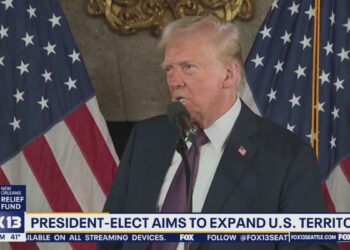Nicolás Maduro, Venezuela’s apprentice dictator, is trying to unleash a war in Latin America, now the only continent that enjoys peace. Probably worried about the bad image he has created for himself by multiplying poverty and restricting freedoms, he has launched an aggression against Guyana, his more modest neighbour, in order to usurp a third of its territory and turn the Essequibo region into his own.
It is pursuing two objectives, one political by provoking a dangerous diversionary initiative among its citizens, and the other economic, which is to seize a territory in which significant hydrocarbon deposits have recently been discovered. A couple of weeks ago it improvised a referendum to find a justification for its claims, in which a more than small and insignificant number of voters, with no guarantees of any kind both at the polls and at the count, proclaimed itself the winner by 95%.
With this result, he did not waste a minute: he already sent a delegate to take the first control and a military contingent, coincidentally commanded by a cousin of the regime’s strongman, Diosdado Cabello, to take up positions. The modest government of Guyana, led by Irfaan Ali, protested, but no one in Caracas reacted. The conquest would mean the loss of a third of Guyana’s territory and 125,000 of its 800,000 inhabitants. Alarm immediately spread among the governments of the continent; almost all of them, with the exception of Cuba and Nicaragua, reacted more or less critically to Maduro in the face of such a threat. Brazil’s Lula da Silva, who presides over a left-wing democratic government, was the most forceful in his reaction.
The most widespread proposal is that the conflict created should be resolved through negotiation or a ruling by the International Court of Justice. Maduro tries to justify the aggression by resorting to arguments based on the border negotiations established with the independence of the Spanish colonies in 1811 (Guyana obtained it from Britain in 1966). The United States has reacted swiftly. Secretary of State Antony Blinken expressed his support for Guyana and the Pentagon announced deterrent manoeuvres in those waters. Meanwhile, Latin American diplomacy is active in an attempt to avoid armed conflict and the UN Security Council will discuss the issue in a closed session next week.
Some press analysts have expressed surprise that the Spanish government has not yet made any statement on a conflict that affects its history and countries in its cultural orbit. This delay has been attributed in some cases to the special relations between former president Rodríguez Zapatero and Nicolás Maduro.
Read more
Source link : https://www.atalayar.com/en/opinion/diego-carcedo/maduro-imitates-putin-and-unleashes-war-in-latin-america/20231212190000194601.amp.html
Author :
Publish date : 2023-12-12 03:00:00
Copyright for syndicated content belongs to the linked Source.








